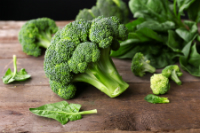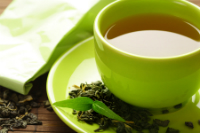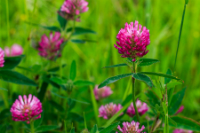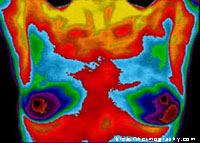October 2016 Edition
What's New
Breast cancer affects men as well as women, but at a much smaller rate. 1 in 1000 men will develop breast cancer during their lifetime.
Boost Breast Health with these Bust Musts

From the bare-breasted days of the cave woman, through the Renaissance and into the era of blonde bombshells, a woman's bosom has been an icon representing both sexual prowess and vitality. But the breasts are also vulnerable. One in eight women will be diagnosed with breast cancer and, each year, about 40,000 women die from the disease. From puberty through the elder years, it's imperative for a woman to take care of her breasts, from the inside out, both physically and emotionally.
The "bust musts" for breast health go beyond screenings and routine self-exams. Until recently, the prevalent thinking was that screenings are the best way to detect and treat cancer before it metastasizes. However, increasing numbers of false-positive tests have led to unnecessary medical treatment. In some cases, screenings have failed to detect active tumors. It could be that timing for screenings should be personalized, based on health and family history, age, and lifestyle habits.
More important than early detection is the power of prevention in the hands of every woman. This includes properly performing breast self-exams (BSE), and taking care of body and mind in ways that boost breast health.
Six Ways to Boost Breast Health
Know Your Bosom. It's important for a woman to be familiar with the look and feel of her own breasts. Performing a monthly BSE is the best way to detect a lump or other abnormality. This video will help you do it right.
Chill Out. In general, excessive stress has negative effects on health. Research indicates that stress can also increase your risk for breast cancer as well as its recurrence (Ohio State U). Because stress impairs immunity, there's evidence that it can alter how aggressively cancer develops. To manage stress, try yoga or meditation.
Go for Green. A component of green tea called epigallocatechin gallate (ECCG) is a powerful antioxidant that is believed to suppress the growth of new blood vessels in tumors. ECCG also seems to play a role in keeping cancer cells from destroying healthy tissue. Enjoy at least a cup or two of tea daily.
Get Crunchy. Broccoli, Brussels sprouts, cauliflower and other cruciferous vegetables contain cancer-fighting compounds that convert excess estrogen into a form that is more "friendly" to a woman's body. Women who eat a high percentage of cruciferous veggies on a daily basis are less likely to develop breast cancer. Enjoy a "crunchy salad" or add steamed mixed veggies to your daily meal plan.
Get Spicy. The turmeric plant contains curcumin, which is known to support a strong immune system. Some research shows curcumin can reactivate genes that suppress tumor development and stave off cancer cells. Add a curry night to your weekly meal plan.
Fiber Up. Fiber from fruits and whole grains helps rid the body of toxins. In addition, flax contains cancer-fighting compounds, called lignans, that can block the negative effects of excess estrogen on cells. Sprinkle flaxseed on your salad or yogurt.
References
Food for Thought. . .
"What lies behind us and what lies before us are tiny matters compared to what lies within us." - Ralph Waldo Emerson
Broccoli: Superhero of Vegetables

Shaped like green mini-trees, broccoli is the superhero of vegetables, containing a powerhouse of nutrients beneficial for digestion, heart health, and the immune system. High in fiber and vitamin C, broccoli is a good source for potassium, vitamin A and B6. Research has established that these nutrients, along with other compounds in broccoli, have anti-inflammatory and cancer-preventing properties.
Broccoli is packed with phytochemicals and antioxidants. These amazing substances influence cancer-fighting activity within our bodies, such as stimulating the immune system, stopping substances we breathe or eat from becoming carcinogens, reducing inflammation that makes cancer growth more likely, and even slowing the growth rate of cancer cells.
Broccoli's secret weapon is actually two chemicals: sulforaphane and indole-3-carbinol (I3C). These chemicals boost the body's ability to detoxify, help moderate estrogen levels, and have been shown to slow the progression of tumors.
It's easy to add broccoli to your diet because you can enjoy it raw, steamed, in stir-fry, soups, slaws, and even in a green smoothie. A serving is one cup; aim for two to three servings per week.
Purchasing tips: Choose organic broccoli florets that are uniformly colored (dark green, sage or purple-green, depending upon variety) and with no yellowing. Store in a plastic bag, with no extra air trapped inside, in the fridge for up to a week.
References
Broccoli with Orecchiette

Pungent garlic and spicy red pepper are balanced by the light sweetness of green broccoli in this vegan dish. It also makes for a wonderful side dish with the fish of your choice.
Ingredients
- 5 garlic cloves
- 1/3 cup extra-virgin olive oil
- 2 (10-ounces) packages frozen chopped broccoli (do not thaw)
- 1 cup water
- 1/4 tsp hot red-pepper flakes
- 1/2 tsp salt
- 1/2 tsp black pepper
- 1/3 cup grated Parmigiano-Reggiano plus additional for serving
- 1 pound dried orecchiette pasta
- 2 Tbsp salt
Preparation:
- Finely chop garlic.
- Cook garlic in oil in a heavy medium saucepan over medium-high heat, stirring occasionally, until fragrant, but not brown. Add broccoli, water, red-pepper flakes, 1/2 tsp salt, and 1/4 tsp pepper and cook, covered, stirring occasionally, until broccoli is tender and almost all of liquid has evaporated, 12 to 15 minutes.
- Meanwhile, cook orecchiette in a pasta pot of boiling salted water (2 Tbs salt for 6 quarts water) until al dente. Reserve 1 cup cooking water, then drain pasta.
- Toss pasta with broccoli, cheese and 1/2 cup reserved cooking water. Season with salt; thin sauce with more cooking water if desired. Serve with extra cheese for sprinkling.
More to Love about Green Tea (Camellia sinensis)

Next to water, tea is the most consumed beverage in the world. There are health benefits to drinking a variety of teas, and the more pure the leaf in your brew, the better. Green Tea leaves, which don't go through an oxidation process, have the richest nutrient profile. Public health scientists report that people who drink at least four cups of green tea daily have a lower overall risk of cancer; additionally, pre- and post-menopausal women have a lower overall risk (or "lower overall incidence") for breast cancer.
Green Tea contains powerful micro nutrients called polyphenols. One of these, known as EGCG (epigallocatechin-3-gallate), plays an important role in cancer prevention. Lab tests and animals studies show that EGCG inhibits an enzyme required for cancer cell growth. Purdue University researchers found "EGCG, in lab studies, was also able to kill active cancer cells with no ill effect on healthy cells." These chemicals are powerful antioxidants with "scavenging" activity that can protect cells from damage.
Green Tea for health enhancement and cancer prevention is well established. However, there hasn't been extensive research on the effect of tea and/or tea polyphenols in human cancer treatment. Scientists are pursuing clinical trials to determine the role of green tea consumption, as well as a dietary supplement of EGCG, in the treatment of different cancers.
To reap the health benefits of tea, drink pure, fresh hot or iced tea. The processing necessary to bottle tea for supermarket shelves actually degrades the quality and availability of nutrients.
References
Nutrient-Rich Red Clover (Trifolium pratense)

Red Clover has a history of medicinal use that crosses continental divides. It is a native plant of the Mediterranean region, central Europe, the Far East, Siberia, and the Himalayas. It was eventually brought to England and America where its use grew from folk remedy to herbal medicine. Red Clover has been used medicinally as a blood cleanser, for balancing estrogen levels, to treat whooping cough, and to soothe skin inflammation such as eczema. It's also used as part of anti-cancer herbal preparations.
The nutrients abundant in Red Clover include the minerals calcium, zinc, chromium, potassium and magnesium, as well as the vitamins A and C, and several B vitamins. It also contains isoflavones, a plant estrogen. Isoflavones may be helpful for menopausal symptoms, such as hot flashes and night sweats. However, some studies showed little or no beneficial effects so more thorough clinical trials are needed.
Researchers have begun studying the role of isoflavones from Red Clover in cancer prevention and treatment. Preliminary evidence suggests these isoflavones may stop cancer cells from growing or actually kill cancer cells in test tubes. Researchers theorize that Red Clover may help prevent some forms of cancer, such as prostate and endometrial cancer. If you have a family history or personal history of cancer, please consult your holistic doctor to determine if Red Clover is appropriate for you.
References
Thermography

One key to breast cancer survival is early detection. And breast screenings remain the gold standard for that early detection, typically in the form of routine mammograms. However, often painful, and sometimes inaccurate, mammography has generated false-positive test results, leading women to unnecessary medical treatments. To counter this, an imaging test known as breast thermography is becoming an important adjunctive procedure.
What is thermography?
Breast thermography (also known as Digital Infrared Imaging-DII) is a 15-minute, pain-free, non-invasive test that shows the structure of your breast while measuring heat emanating from the surface of your body. Changes in skin temperature are the result of increased blood flow. This is important because even early-stage cancers need a blood supply to bring in nutrients to feed the cancer.
Because temperature change shows up as colors brighter than those of healthy cells, thermography can identify precancerous or cancerous cells earlier and with less ambiguous results. Studies indicate that an abnormal thermography test is 10 times more significant as a future risk indicator for breast cancer than having a family history of breast cancer.
Is it Right for Me?
The FDA has authorized breast thermography as a risk assessment tool to be used in addition to - not in replace of - mammography. Women must be at least 20 years old. It's not suitable for women who have very large or fibrocystic breasts, are using hormone replacement treatment, have had cosmetic breast surgery, or are nursing or pregnant. Consult with your physician to determine if it's an option for you.
When to Test (may vary based on personal and family medical history)
Age 20
Age 20 - 29
Age 30 and over
References
Guiding Principles
The information offered by this newsletter is presented for educational purposes. Nothing contained within should be construed as nor is intended to be used for medical diagnosis or treatment. This information should not be used in place of the advice of your physician or other qualified health care provider. Always consult with your physician or other qualified health care provider before embarking on a new treatment, diet or fitness program. You should never disregard medical advice or delay in seeking it because of any information contained within this newsletter.
|